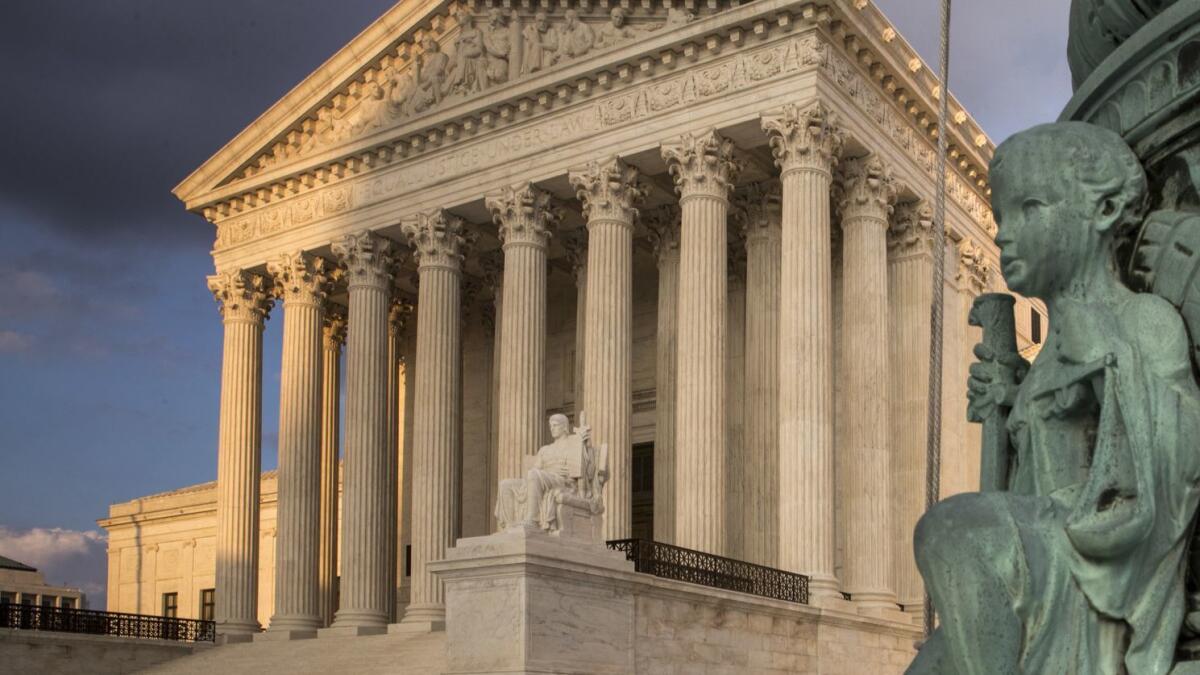Trump vs. ‘Dreamers’: Supreme Court to decide on DACA during the election year

- Share via
Reporting from Washington — The Supreme Court agreed Friday to decide whether President Trump may end Obama-era protections for the young immigrants known as “Dreamers.”
After months of delay, the justices announced they would hear arguments in the fall over whether the administration has the authority to “wind down” the program, which suspended deportation for these young immigrants who were brought into the country as children.
Under the court’s schedule, a decision would not be handed down until late spring of next year, just as the presidential campaign moves into high gear.
The long legal dispute has been a source of anxiety for the nearly 700,000 young adults. covered by the program. They have been living and working in the U.S. legally under the Obama administration program. But if Trump’s termination of Deferred Action for Childhood Arrivals, or DACA, is allowed to proceed, they could be subject to deportation to foreign countries they have never known.
The dispute has been a source of frustration for Trump administration lawyers, who have tried for a year and a half to get the issue before the high court.
It’s possible, though unlikely, that the court’s intervention will prompt Congress and the White House to resolve the Dreamers’ status through new legislation.
The decision comes a day after the Supreme Court delivered a stinging setback to Trump by ruling that the administration had failed to offer a legitimate explanation for adding a citizenship question to the 2020 census. The judges who ruled against Trump’s move to end DACA said much the same. They said while the administration could repeal a major policy adopted earlier, it needed to offer a valid explanation for ending it.
In Thursday’s opinion in the census case, Chief Justice John G. Roberts Jr. said the administration has the authority to make changes in the census. “It is hardly improper” for the officials of a new administration “to come into office with policy preferences and ideas.”
But federal law still requires the administration to give a “reasoned explanation” for changing the government’s policy, he said. A “contrived” explanation will not suffice, he said.
Throughout the litigation over the termination of DACA, the administration’s lawyers have struggled to provide an explanation that has satisfied lower courts.
In 2012, President Obama and then-Homeland Security Secretary Janet Napolitano announced they were temporarily suspending deportation of young immigrants who had come to this country when they were under age 16 and had clean records ever since. Those who qualified for the relief could obtain work permits.
When Trump took office in 2017, he said he would show “great heart” to the Dreamers. But in September of that year, he went along with canceling the special protection after then-Atty. Gen. Jeff Sessions decreed that Obama’s order was “unconstitutional.”
Lawsuits were filed in California to block the repeal, including one from the University of California and Napolitano, now its president. In January 2018, U.S. District Judge William Alsup said Trump’s action was based on a “flawed legal premise” because Obama as president had the legal authority to suspend deportations. He then issued a nationwide order blocking the rollback from taking effect. Judges in New York and Washington, D.C. later handed down similar orders.
Solicitor Gen. Noel Francisco, representing the Trump administration, asked the high court to take up the cases immediately, but the justices refused. In November, the U.S. 9th Circuit Court of Appeals upheld Alsup’s order in a 3-0 decision.
Francisco then again asked the justices to move quickly to grant review during the winter, to hear arguments this spring and to decide the issue before the court’s summer recess. The justices took no action until now.
Department of Homeland Security vs. Regents of the University of California and two companion cases will be scheduled for one argument in the late fall.
Trump and his lawyers have insisted that he has the legal authority to rescind Obama’s DACA policy and that no judge can stand in the way.
The judges who disagreed said the reversal of a broad immigration order is subject to review in court. They also said the Trump administration officials violated federal procedural law by abruptly changing a regulatory policy without offering a legitimate explanation.
Three years ago, the Supreme Court was evenly divided on a second and larger Obama order that would have shielded about 4 million parents who were in the country illegally but had children who were permitted to be in the United States. Until Sessions became attorney general, however, no one had challenged the earlier DACA policy as unconstitutional.
In defense of Trump, Francisco argued that judges in California were wrongly interfering with the president’s authority to establish immigration policy. He urged the high court to throw out the judges’ orders that “command the government to preserve a policy that affirmatively sanctions the ongoing violation of federal law by 700,000 aliens who have no lawful immigration status and no right to the policy’s continuation.”
“We are pleased the Supreme Court has agreed that this issue needs resolution,” said Justice Department spokesman Alexei Woltornist.
California Atty. Gen. Xavier Becerra said the government has approved 373,000 DACA renewal applications since judges had put the termination on hold.
“In California and across our nation, Dreamers enrich our communities as scholars, entrepreneurs, first responders and much more. We look forward to making our case before the Supreme Court,” he said.
More stories from David G. Savage »
More to Read
Get the L.A. Times Politics newsletter
Deeply reported insights into legislation, politics and policy from Sacramento, Washington and beyond. In your inbox twice per week.
You may occasionally receive promotional content from the Los Angeles Times.











